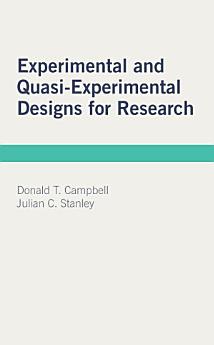Experimental and Quasi-Experimental Designs for Research
About this ebook
Ratings and reviews
About the author
Donald T. Campbell (1916–1996) was a prominent American social scientist and psychologist known for his work in methodology and epistemology. He was a long-time faculty member at Northwestern University and a past president of the American Psychological Association. His seminal work with Julian C. Stanley, Experimental and Quasi-Experimental Designs for Research, remains a foundational text for researchers across various disciplines.
Julian C. Stanley (1918–2005) was an American psychologist and a strong advocate for accelerated education for academically gifted children. At Johns Hopkins University, he founded the Study of Mathematically Precocious Youth (SMPY) and the Center for Talented Youth (CTY), pioneering the use of above-grade-level standardized testing to identify and support high-achieving students. He also co-authored the influential Experimental and Quasi-Experimental Designs for Research with Donald T. Campbell.




